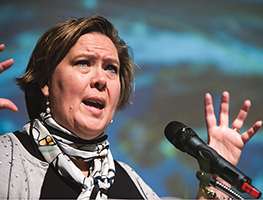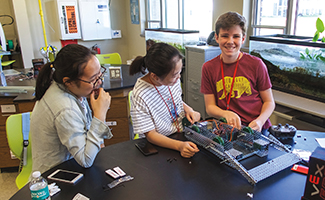
Global Diplomas
Academic programs that develop skills for work and productive lives in an interconnected world
BY HEATHER L. SINGMASTER AND JENNIFER G. MANISE/
School Administrator, January 2019

|
Jennifer Manise
|
Wisconsin began a great experiment during the 2013-14 school year: What if the state designed a global certificate for high school students and turned it over to local school districts to manage?
The Wisconsin Department of Public Instruction created the Global Education Achievement Certificate to encourage students to acquire the skills that will allow them to work in a global economy and be productive global citizens. Students earning the certificate are known as Global Scholars.
The opt-in program for districts (80 out of 421 across Wisconsin currently use the program) is structured like certificate programs at the collegiate level. It does not require the creation of new courses. Instead, students can earn a Global Education Achievement Certificate by completing existing courses that have been pre-approved by the state. By allowing districts and schools to take the lead, existing resources can be highlighted and students can be encouraged to take advantage, without having to spend additional district funds.
A Natural Fit
The 1,630-student Ripon Area School District in central Wisconsin joined the program in 2016. Ripon’s mission to “Inspire learners, engage the community and enrich the world” was a natural fit with global education certification for high school students.
“The program validates the global partnerships we have established with our sister schools in China and encourages students to enroll in classes with global content in the arts, sciences and humanities,” says Christine Damm, the district’s director of curriculum, instruction and assessment.
Anecdotal evidence and feedback from across the state suggest that global certification programs help schools to distinguish themselves in attracting and retaining students and families who value language, and intercultural and global learning. Students value the degree to which the Global Education Achievement Certificate program allows them to personalize and focus their learning through an area of interest and relevance connected with a global lens.
Working toward greater equity in access to these critical skills that are in high demand within our linguistically and culturally diverse workplaces, communities and world is a worthy charge for education leaders today.
Call them what you like — a global certificate, global distinction, global seal or something else — since Wisconsin launched its version, we have observed a significant increase in the number of school districts and states offering honors to students across the nation to recognize their global competence.
Making the Case
What do we mean by global competence? Global competence is possession of the knowledge, skills and dispositions to understand and act creatively on issues of global significance.
Last year, the U.S. exported $2 trillion in goods and services to just about every country and municipality on the planet. An interesting detail about that figure is that 98 percent of the exporting companies had fewer than 500 employees. They are present in every state, and those companies are located in urban, suburban and rural school districts. Preparing students to make global-local connections in work and life isn’t just for kids in Wisconsin. It’s suitable for all students, and many states and districts are responding accordingly.
Consider Washington, D.C. If you wander through the downtown, you will encounter diplomats, business people, tourists and students who come from the four corners of the globe. A recent study of the region by New American Economy showed a 148 percent increase in job postings requiring bilingualism. In the 2017-18 school year, D.C. Public Schools, recognizing the importance of certifying their graduates as competitive for this work environment, launched a Global Scholar Certificate program.

|
Chinese and American students jointly tackled hands-on STEM projects during the Ripon Area School District’s Summer 2018 International Engineering, Science and Leadership Camp in Wisconsin.
|
Like Wisconsin, budgetary considerations were top of mind, and the district designed the program to be cost-neutral by mapping and utilizing existing global education re-sources. To get its global certificate program off to a good start, the district focused on students who already had study abroad and foreign language experiences and had satisfied most or all of the other graduation requirements.
Now, D.C. Public Schools is working with school-based coordinators to recruit more students and ensure the rigors of the certificate program are being met.
Nearly all global education certificate programs have the following qualities in common:
» Global Coursework
Students have a minimum requirement for global coursework, either through a mix of academic disciplines or through project-based learning or competency-based approaches.
» Global Experiences
Students take part in service learning, internships, capstone projects, travel or other programs that allow firsthand global experiences.
» Demonstrated Evidence of Global Competence
Program designs vary, as do personalized student experiences, but they all require students to demonstrate their global competence.
Expanding Access
With so many competing priorities — academic standards, college admissions, state and district assessments — why add another program to an already crowded plate in rural and suburban districts? One answer is that students, educators and policymakers alike support the option of allowing students to obtain credentials beyond traditional means. Today, some form of global certification is available as an opt-in in almost one quarter of states, and additional districts are looking to adopt this type of program.
Global certificate programs help engage students in real-world learning that’s relevant to their future. The Illinois Global Scholar project requires a capstone project. Students spend one semester exploring their idea and another semester taking action on their research. This pushes students to dig deeply into researching topics of interest and raising their voices on issues that matter most to them. While the topics differ, the action-based research, communication and collaboration skills are universal and prepare students well for the academic rigors of college.
Global education certificates also provide more equitable opportunities to pursue different types of achievement than standardized assessments allow. We see an early trend of elite public and private schools moving away from some types of advanced credentialing, notably Advanced Placement courses. At the same time, students are actively pursuing opportunities to differentiate themselves and integrate global relevance into their school experiences.
Hingham High School in eastern Massachusetts runs both a global citizenship program for deeply involved students who want to pursue an academic credential and a global citizenship club that is open to all students with an interest in global affairs.
About 940 high schools nationwide participate in the International Baccalaurate program. IB schools provide another opportunity for local school leaders to build equitable access to global understanding. In Fairfax County, Va., George C. Marshall High School has a significant percentage of seniors seeking the rigorous full IB diploma, which requires a set of courses, an essay and community service. Recognizing that the IB diploma is not the right course of study for every student, George Marshall leadership instead set a goal of having 100 percent of students take at least one IB course and exam. Last year’s senior class attained more than 90 percent. Most notable is how much the gap has closed among white, non-white and students with disabilities participating in IB coursework.
To make progress in shrinking accessibility gaps requires a clear plan to do so and benefits from continuity of leadership.
Educator Benefits
Student engagement, real-world experiences and democracy of access are causes educators can rally around. Global credentials also benefit teachers. The Illinois Global Scholar model was actually created by a few volunteer educators from around the state who care passionately about preparing their students for careers and civic engagement. While they could have spun the concept off into a nonprofit and worked from outside the system, these amazing teachers are committed both to their students and to remaining in the classroom. Shepherding this work in their respective districts and their state serves the bigger purpose that drew many of them to devote their lives to educating students in the first place.
North Carolina is offering global educator status at the school and district levels rather than individual student distinctions. The state instituted a Global Educator Digital Badge for Teachers in 2014. Educators must complete a rigorous set of professional development focused on global learning, which also meets the state-mandated requirements for ongoing professional development, and a capstone project. The capstone consists of creating an instructional unit focused on global content, which then is delivered and observed by the supervising administrator and vetted by the school, district and state for inclusion in North Carolina’s collection of statewide resources. The teacher has up to two years to complete the process, at which time the state awards the digital badge and places it on the teacher’s educator profile.
The global school and global district distinctions in North Carolina enable schools to apply for distinction by the state board of education. The rigorous, evidence-based process is a tangible look at comprehensive services for all students, professional development for all teachers and school/community partnerships that produce “globally competitive graduates.”
Students and educators are eager to demonstrate that they have the knowledge and skills for an interconnected world. It’s time we give them the opportunity to do so.
HEATHER SINGMASTER is director of the Center for Global Education at the Asia Society in New York, N.Y. Twitter:
@hsingmaster.
JENNIFER MANISE is executive director of the Longview Foundation in Falls Church, Va.